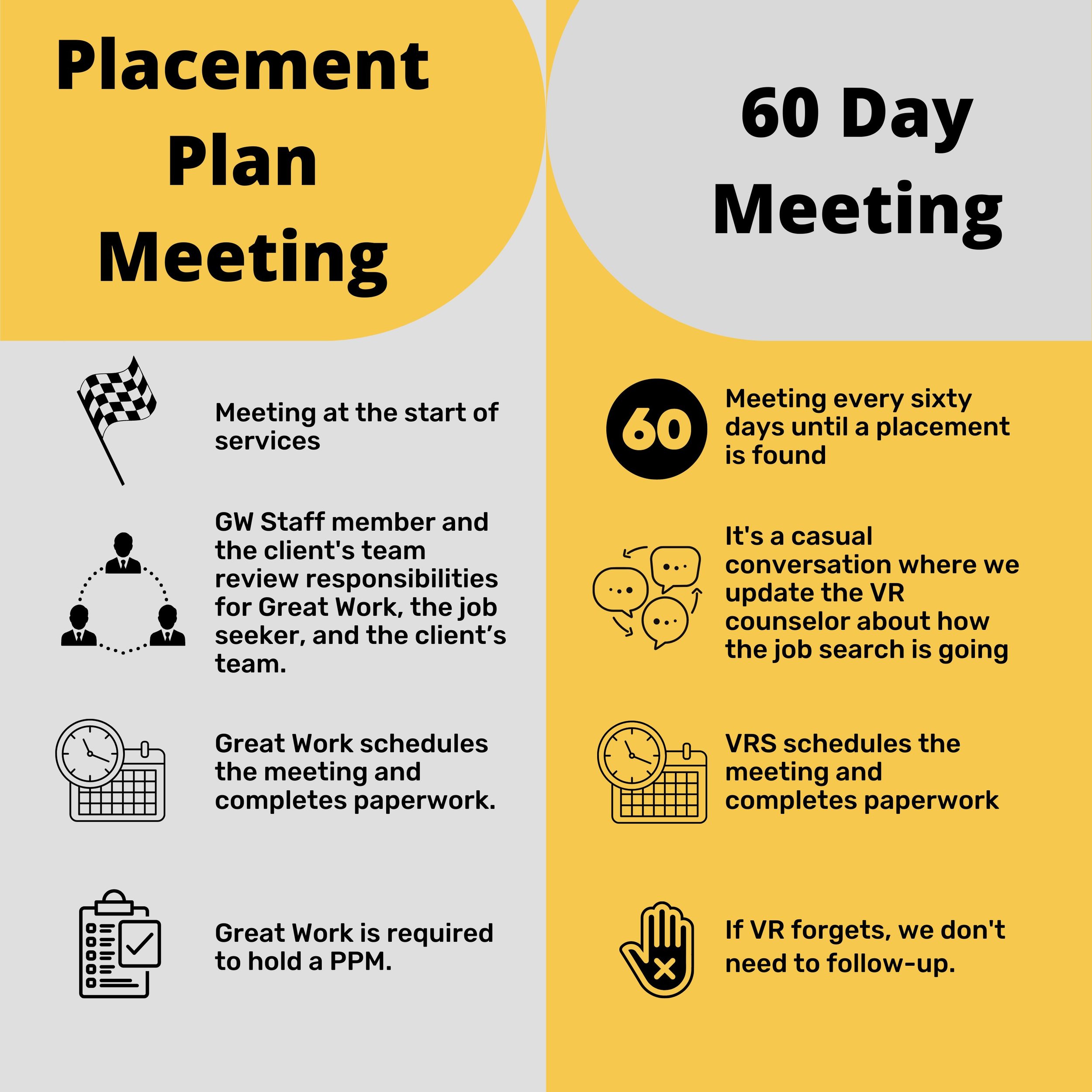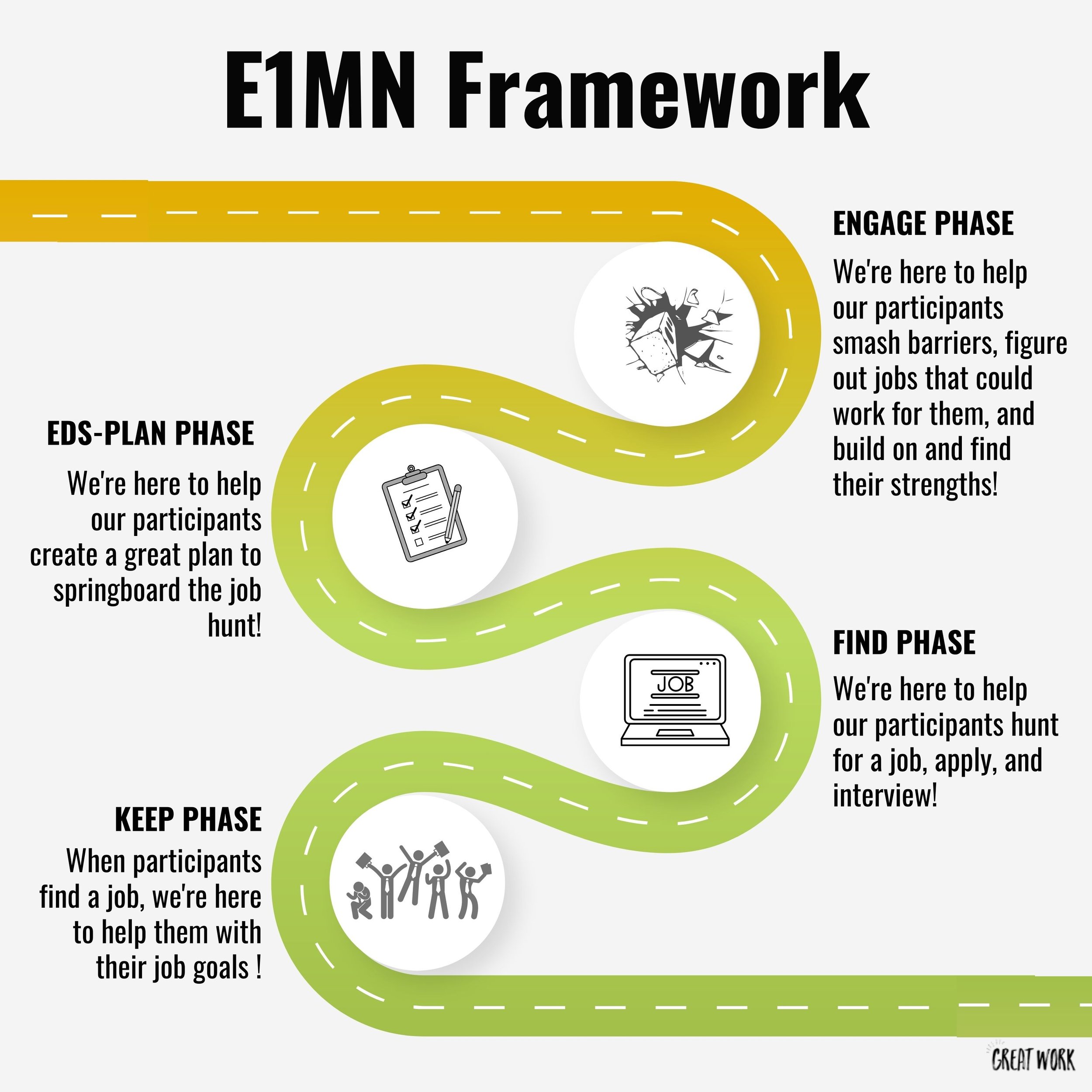
Find Phase Services
Find Phase Overview
(VRS Funded)
The Find Phase service’s goal is to get our participants a great job that fits their job goals and needs by assisting them through the job hunting and interviewing process!
The Find Phase consists of helping people find jobs, apply for jobs, and get hired at a job. Individuals receiving services should have a clear idea of what they’re looking for and the risks and benefits of employment. This should result in integrated and competitive work.
Find Phase check-ins should be focused on the jobs you found, your client’s opinion of them, and the next steps. It's a good goal to shoot for 5 positions found before each check-in.
You should be spending around as many hours as efficient job hunting and interview support allow. We want to be giving our clients great and quick client service.
This phase is funded by Vocational Rehabilitation Services or SSB! The service we are approved to provide is “Placement and Retention Services” otherwise known as “Performance-Based Agreement (PBA or E1PBA).” Most clients will switch to VRS for job searching, but in rare cases when exceptions may be made for Employment Development - Find (which is a waiver service).
There are no 6790s when funded by VRS. We just need to make sure we have a purchasing agreement before providing services.
Resumes and cover letters SHOULD NOT be made from scratch in this phase. We CAN provide quick updates or customizations to the cover letter and resume.
“I want help to find a job that pays at least $2000 a month so I can pay my bills. I'd like to work in an office, answering phones and making appointments for people.”
“I want to work at a zoo or a place where I will constantly be interacting with animals. I want to make at least $17 an hour and would prefer to not have too much interaction with coworkers.”
Important Deadline: Submit the VRS Monthly Progress Report by the 10th of each month.
Find Phase Services
-

Job Hunting
We offer support job hunting! We job hunt through a various methods - online and in person.
-

Assist with applications
Some individuals will want to apply for jobs themselves, whereas other individuals will want us to apply for jobs for us. As a general rule, you should always have the individual’s permission before applying for jobs.
When an individual is in the Find Phase, we can assist with applying for jobs that they are interested in. You will use the “Sample Application” in their client folder that will help you with answer the questions for the applications online. You should also submit their resume and a cover letter with the applications.
-

Interview Assistance
We can accompany and assist our participants in interviews if they would like.
-

Provide support during onboarding
We offer assistance in onboarding at organizations. We don’t need to be an expert in I-9s, W4s, or other documents.
Often times our participants like our support while onboarding or during their first shift.
Find Phase FAQs
-
We know what their job goal is and now it’s up to us to find them a job!
These check-ins should be focused on the jobs you found, your client’s opinion of them, and the next steps. They waited long enough to get to this stage.
It's a good goal to shoot for 5 positions found before each check-in.
You should be spending around as many hours as efficient job hunting and interview support allow. We want to be giving our clients great and quick client service.
-
Oftentimes, the best way to job search is to devote a chunk of time in your schedule (1 - 2 hours) and dive in.
Get creative! If Indeed isn’t getting you the results that you need, try other methods… like stopping by businesses in person!
-
You should spend as much time as possible efficiently job hunting.
-
Find Phase participants are typically met with weekly.
-
1. Ask your client and their team if they would like to create a shared email address for applying to jobs
Creating a shared email address will allow us to have a specific email to connect with employers that we have access to and the individual has access to. This is helpful to follow up with employers, see the status of applications and help the individual with professional communication. You will want to check-in with the individual to see if they would like to have a shared email address that we can help with monitoring.
2. Create a shared email address using gmail, using recoverymail@greatworkmn.com as the recovery email address
It is extremely important to use recoverymail@greatworkmn.com as the recovery email address. This will ensure that any staff will be able to access this email address when there is staffing changes or unexpected absences. If you need to log into an account using the recovery email, you will need to reach out to your supervisor.
3. Save the login information into REV
Saving the login information into REV will ensure that other staff are able to access the account as needed; instead of having to create a new account or miss out on opportunities. Be sure to save the client’s email and password!
4. Assist your client in logging into the account
We want to empower our clients as much as possible. Helping them log into the shared email address will allow them to keep an eye on any job opportunities and interview requests. When you help them log into the account, you can have a conversation about the purpose of this email. We want to encourage clients to use this email for work related things only, such as applying for jobs, reaching out to employers, etc. However, they should use their personal email for anything personal, such as creating social media, chatting with friends, etc.
5. If you are unable to log into the account for any reason, reach out to your supervisor to recover access to the account.
If for some reason you are not able to log into the account, we may need to use the recover email that we established in step 2. Your supervisor should be able to access the recover email and help you gain access to the account.
-
Notify your supervisor, client’s team, VR counselor, and Case Manager
Add job placement in REV with the employment start date AFTER their first day of work. NOT BEFORE
Request Job Coaching Services and a Travel Authorization from the VRS Counselor, starting IMMEDIATELY
You cannot do any on-the-job support or connecting with the managers until you have a job coaching authorization from VRS or employment support services (ESS) from waiver!!!!
Under the PBA, we are only authorized to provide “Follow-Up” services, which is a very light level service. It only authorizes us to help assist them with orientation paperwork, checking in regularly, and light level communication with supervisors. However, it does not authorize us for any on-the-job supports, intensive training, creating visuals, etc.
The job coaching authorization does allow us to assist with on-the-job supports, intensive training, creating visuals, etc. However, the individual must be present for all work being done to support them in their goals.Begin scheduling intake meeting for Employment Support Services through waiver as soon as possible
It is very important that we begin scheduling an intake meeting as soon as possible to provide on-going support for the individual in their new job! ESS allows us to provide a more intensive level of support, including on-the-job support, regularly checking in with their managers, completing additional benefits analysis if wages change, visuals, etc. The individual will be authorized for both PBA and ESS during the first 90 days of employment. After 90 days, we will receive final milestone from their PBA and we will continue to support them through their ESS authorization.Within 7 days of start date, you should email the VRS Counselor with the following information:
Employer Name
Employer Address
Wage
Job Title
Hours
Start Date
Types of benefits they are receiving from work
Name of person who gave you the information
Date the information was received
Collect the relevant information to complete the “Job” tab in REV.
Continue to provide regular email updates and monthly progress reports to the VRS Counselor for the first 90 days of employment.
-
These are benchmarks that Great Work receives payment for.
Each milestone reached means that Great Work receives that payment for the service. We want to be reaching these milestones quickly and efficiently.
Review information about milestone payments
https://mn.gov/deed/job-seekers/disabilities/partners/guide/contracted-services/services/pba/
-
Nope!
During the Find Phase, no 6790 is needed, but A SERVICE AUTHORIZATION IS.
We NEED to have the service authorization in hand before working on Placement Plan documentation and before we hold the Placement Plan Meeting. This is different than Waiver services where we can get temporary units.
-
Nope! We want to make sure we have a purchasing agreement from VR before providing services. Ask the office specialist if you are unsure if we have one!
-
On the tenth of each month, you should be sending out a monthly progress report for any client that has an active PBA authorization (Find Phase). This will provide the VR counselor with up-to-date information about the progress that we have made over the past month, what’s going well, and what we can improve on.
These monthly progress reports are very important aspect of our contract and required for us to achieve each of the milestones.
There are three different sections in the progress report, you should only fill out the section that is relevant to the work that you did over the past month:
Job Search Update: You should only complete this section if you were actively searching for jobs during the month. You should also include your job search record dashboard!
Employment and Follow-Up: You should only complete this section if your client found a job and has started working their first shift
Job Placement and Follow Up Service Closure: You should only complete this section when your client has been working for 90 days. This will be the last monthly progress report you will complete for that individual!
-
The monthly progress reports are due by the 10th of every month.
-
You are required to coordinate the Placement Plan Meeting.
The VRS counselor leads the 60-Day Meetings. If they do not reach out to coordinate, no need to worry about it.
Find Phase Meetings
Participants receiving Find Phase services are funded by Vocational Rehabilitation Services.
Great Work is required to lead the Placement Plan Meeting to start off the Find Phase or PBA services. This serves as the equivalent of an intake meeting for VRS services.
When a client is in the Find phase and is actively searching for a job, the VR counselor will reach out to the team requesting to meet either over video chat or in person every 60 days for a 60 Day Meeting. The purpose of the meeting is to review progress, identify & address potential barriers, amend the employment/placement plan as needed, identify new strategies, and determine if the Find phase is still the best fit for them at this time.
The VR counselor is responsible for scheduling, leading, and documenting the meeting. They will likely ask questions about how things are going and what is/isn’t going well with the job search.
PBA vs E1PBA
The E1PBA (Performance Based Agreement) and the PBA are both ways the job search is funded.
Participants who have an E1PBA have a Medicaid waiver and go through the E1MN framework.
Participants who have a PBA do not have a Medicaid waiver and do not go through the E1MN framework. We’re just there to job hunt! They are not technically in the Find Phase.
Milestones are checkpoints where Great Work gets a cash pay-out for our efforts!. E1PBAs have an additional payout after 120 days after PPM (Placement Plan Meeting).
The E1MN Framework
The Employment First Minnesota Framework (E1MN) is designed to help make sure that Great Work helps our participants explore employment, plan for employment, find a job, and keep a job that is a perfect fit for them! Click below to learn more about each phase:




